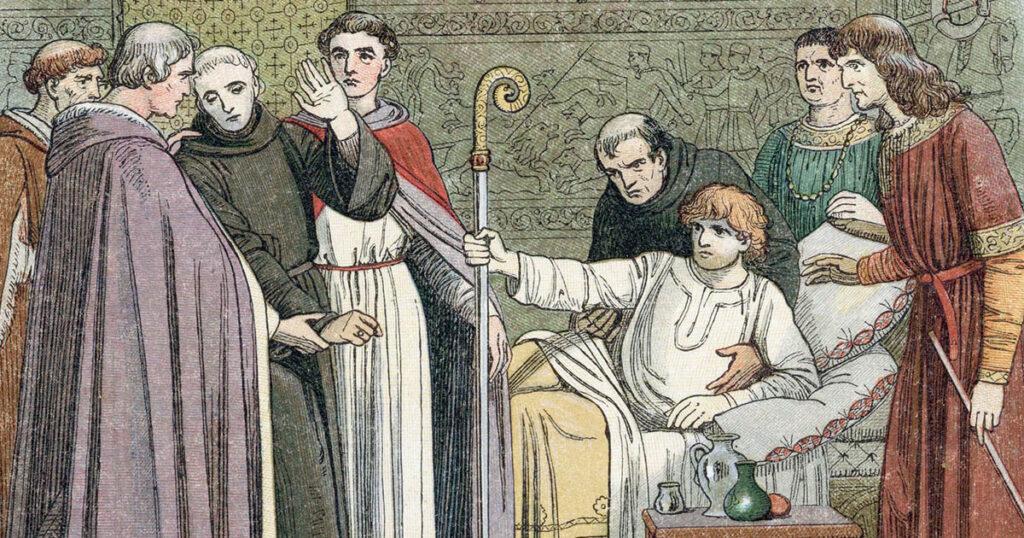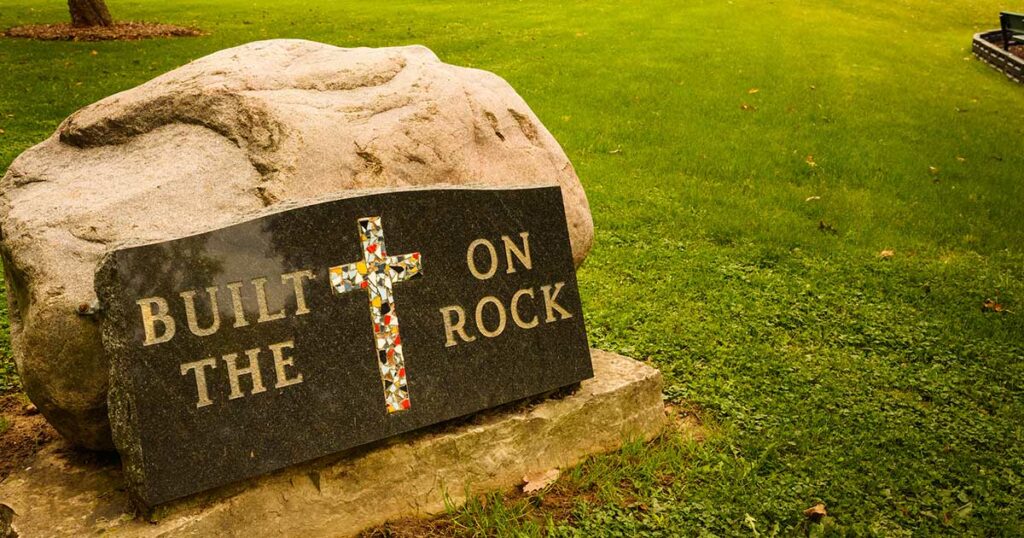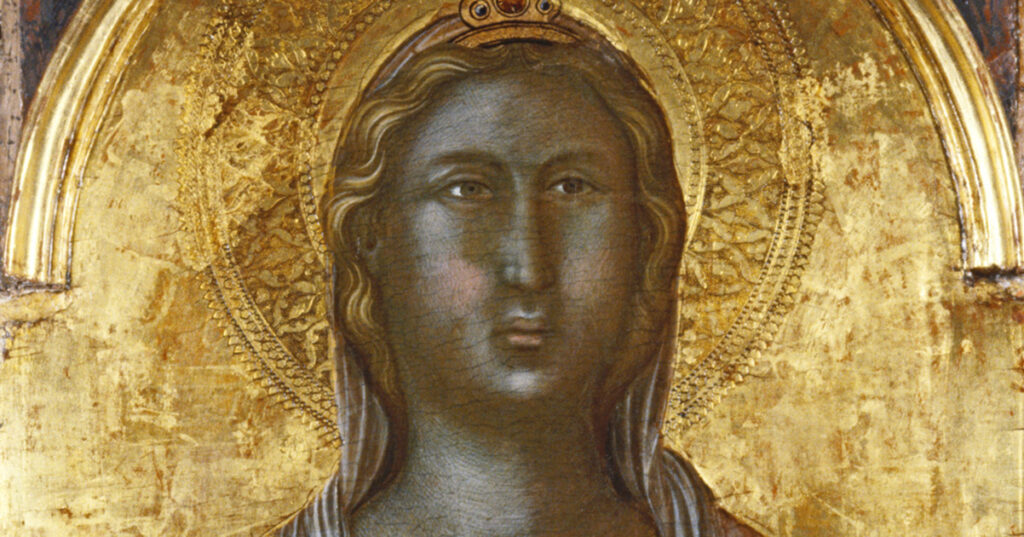On April 21, The Lutheran Church—Missouri Synod (LCMS) commemorates the great Archbishop of Canterbury St. Anselm. Anselm was born in Italy around A.D. 1033. He was forced into the seat of Canterbury and thus made primate of England in 1093, and he spent his remaining years writing, preaching and fighting to maintain the independence of the English church from the Norman kings. He died on April 21, 1109, which was Holy Wednesday that year.
I have long loved both his meditations and his prayers. The meditations are probably more famous, particularly his outstanding “Meditation on Human Redemption” (Cur Deus Homo?), but the prayers are actually — in my opinion — the better part. Oh, not his many prayers to the saints (he was, after all, a child of his own time and that abuse was solidly in place in those days), but his actual prayers, particularly to his Savior. Let me just share a few snippets (they all come from The Prayers and Meditations of St. Anselm, and were translated by Sister Benedicta Ward [Penguin Books, 1973]).
Prayer to Christ
Lord Jesus Christ, my Redeemer, my Mercy, and my Salvation: I praise you and give you thanks. They are far beneath the goodness of your gifts, which deserve a better return of love; but although I requite so poorly the sweet riches of your love which I have longed to have, yet my soul will pay its debt by some sort of praise and thanks, not as I know I ought, but as I can. (p. 93)
Did you notice the personal touch there? “My redeemer, my Mercy,” and so on? That’s the job of faith: to make the plural pronouns singular, to receive individually what Christ did for the world. This is what St. Paul does in Galatians 2: “I live by faith in the Son of God, who loved me and gave himself for me” (Gal. 2:20; emphasis added). Jesus is thus the gift given personally to me of redemption, mercy and everlasting salvation. And how on earth can I ever offer Him the praise and thanks due Him for the magnitude of the gift? Not going to happen, of course. And yet, I will return His love with my sacrifice of praise and thanks no matter how short I fall in that offering. Anselm’s phrase “not as I know I ought, but as I can” even has echoes of the traditional Canon in the Mass: “Not weighing our merits, but pardoning our offenses.” Herman Sasse once opined that the Christians of the Middle Ages lived from the Gospel in that prayer, and I think you hear Anselm doing that exactly here.
Before receiving the Body and Blood of Christ:
Lord, I acknowledge that I am far from worthy to approach and touch this sacrament; but I trust in that mercy which caused you to lay down your life for sinners that they might be justified, and because you gave yourself willingly as a holy sacrifice to the Father. A sinner, I presume to receive these gifts so that I may be justified by them. I beg and pray you, therefore, merciful lover of men, let not that which you have given for the cleansing of sins be unto me the increase of sin, but rather for forgiveness and protection. (p. 100)
This is Anselm’s version of the prayer of humble access. Who of us could ever feel ourselves worthy to approach the sacred mysteries? The very body and blood born of Mary? The very body and blood lifted on the tree? The very body and blood that are alive forever beyond the grave? This very body and blood now reach us, hidden beneath the humble appearance of the bread and wine. As we come, we must confess our unworthiness to approach and to touch; we have no worthiness that grants us access. Rather, it is God’s mercy, the mercy that led Him to the cross as “a holy sacrifice to the Father.” This mercy led Him to yield up His life for sinners so that they could be justified, declared righteous by a Word that makes them righteous. What God says, He causes to be. Remember how we sing: “Thy strong Word bespeaks us righteous; Bright with Thine own holiness” (LSB 578:3). And so despite the pile of our sin and our wretchedness, we come to receive the Eucharist precisely in order to be justified. For this is the body and the blood of Him who alone is our righteousness. It is also possible to receive this gift in a harmful way. Think 1 Corinthians 11 (see also this article). And so we ask also that our reception of these gifts may bring us cleansing, forgiveness and protection rather than an aggravation of our well-deserved punishment.
And my all-time favorite is this prayer in which Anselm meditates upon the cross of our Lord:
We do not acknowledge you because of the cruelty that godless and foolish men prepared you to effect upon the most gentle Lord, but because of the wisdom and goodness of him who of his own free will took you up. For they could not have done anything unless his wisdom had permitted it, and he could not suffer except that in his mercy he willed it. They chose you that they might carry out their evil deeds; he chose you that he might fulfill the work of his goodness. They that by you they might hand over the righteous to death; he that through you he might save sinners from death. They that they might kill life; he that he might destroy death. They that they might condemn the Saviour; he that he might save the condemned. They that they might bring death to the living; he to bring life to the dead. They acted foolishly and cruelly; he wisely and mercifully. Therefore, O Cross to be wondered at, we do not value you because of the intention of their cruel folly, but according to the working of mercy and wisdom. (pp. 102–3)
This prayer is to me the most shockingly profound thing the great saint penned. He meditates upon the tree and apostrophizes it: He speaks to it, rather than to the Lord. And he sees from the beginning how the cross turns everything, absolutely everything, topsy turvy. I know a woman who is a Jehovah Witness. She loathes the image of the cross. She once asked me, “If you had a friend who had been killed by a handgun, would you post images of the handgun all over your house?” How I wish she would enter into the joy of St. Anselm here.
We do not celebrate the cruelty in the cross. The evil done to our Lord Jesus’ body was horrific, and we do not minimize it. But we see standing behind it something far greater. Jesus said: “No one takes [my life] from me … I have authority to lay it down, and I have authority to take it up again” (John 10:18). And so the cross does not mark the tragic death of a friend, but the wisdom and the goodness of a gentle and loving Lord who freely chooses to take that path in order that He may reverse everything. So Anselm’s huge list of the contrasts: Those who crucified the Lord chose the cross to carry out their evil deed, even if they didn’t grasp its magnitude as deicide. But look in awe and see: He chose the exact same event to fulfill His astounding work of goodness, a work that will forever give the lie to the notion that God is somehow “against” you. Then Anselm really starts cooking: They use the cross to hand the righteous One over to death; He uses it to save us sinners from death. They use it to kill Life. He uses it to wipe out death. They use it to condemn the Savior and He to save the condemned. They use it to bring death to the Living One; He to bring life (His own life) to the dead. They acted in folly and cruelty, but He acted in unspeakable wisdom and mercy. And so Anselm invites us to sink down on our knees in wonder and awe before this marvel of the cross and what Christ has done there.
There are so many more prayers I’d love to be able to share with you, but hopefully those are enough to ignite an appetite for more of this remarkable medieval theologian. He shows us the path of prayer, of calling in much tenderness upon the Lord Jesus and being confident before Him, certainly not in our righteousness (for we have no goodness of our own), but confident of His unfailing and eternal tender mercy and love.
Photo by Getty Images.






What profound prayers of faith and understanding of the gifts of our Lord. Thank you for providing them. I will use them.
Thank you for sharing